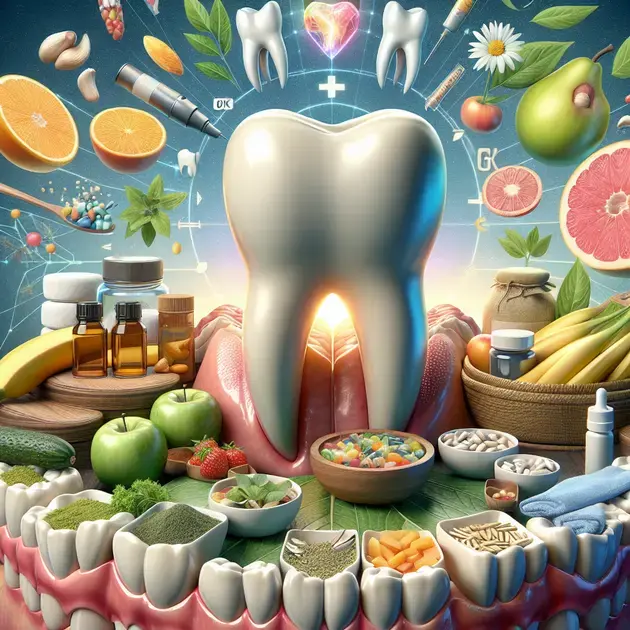Periodontitis is a common but serious gum infection that damages the soft tissue and destroys the bone that supports your teeth. In this comprehensive guide, we will explore the most effective medications available to treat periodontitis and restore oral health.
Recent studies have shown that a combination of antibiotics and antimicrobial mouth rinses can significantly reduce the bacteria causing periodontitis, leading to better treatment outcomes. Understanding the various medications and their benefits is crucial in effectively managing this chronic condition.

Understanding Periodontitis Medication Options
When it comes to managing periodontitis, medication can be an essential part of the treatment plan. Understanding the different medication options available is crucial for effectively combating the disease. Here are some key points to consider:
1. Consult with your dentist or periodontist:
Before starting any medication for periodontitis, it is important to consult with a dental professional. They can assess your specific condition and recommend the most suitable medication for your case.
2. Consider prescription antibiotics:
In cases of severe periodontitis, prescription antibiotics may be necessary to control the infection. Common antibiotics used for periodontitis include doxycycline and minocycline. Your dentist can prescribe the appropriate dosage and duration of treatment.
3. Explore antimicrobial mouth rinses:
Antimicrobial mouth rinses can help reduce the bacteria in your mouth that contribute to periodontitis. Look for mouth rinses containing chlorhexidine or essential oils like tea tree oil. Use them as directed by your dentist for optimal results.
4. Follow a consistent medication schedule:
Consistency is key when it comes to medication for periodontitis. Make sure to follow the prescribed dosage and schedule provided by your dentist. Skipping doses or discontinuing medication prematurely can hinder the effectiveness of treatment.
5. Monitor your progress:
Keep track of how your gums and overall oral health are responding to the medication. If you notice any adverse effects or changes, contact your dentist immediately for further guidance.
Exploring Antibiotics and Mouth Rinses for Periodontitis
Antibiotics and mouth rinses are common treatment options for periodontitis. Understanding how these medications work and when to use them is essential for effective management of the disease. Here’s a step-by-step guide to exploring antibiotics and mouth rinses:
1. Research different antibiotics:
Before starting antibiotic treatment for periodontitis, research different types of antibiotics commonly prescribed for the condition. Websites like WebMD or the American Academy of Periodontology can provide valuable information on antibiotic options.
2. Discuss options with your dentist:
Once you have gathered information on antibiotics, discuss your findings with your dentist. They can recommend the most appropriate antibiotic based on your specific needs and the severity of your periodontitis.
3. Learn about antimicrobial mouth rinses:
Explore the benefits of antimicrobial mouth rinses in managing periodontitis. Websites like Colgate or the Mayo Clinic offer insights into the use of mouth rinses containing antimicrobial agents for oral health.
4. Purchase the recommended medications:
After consulting with your dentist and deciding on the right antibiotics and mouth rinses, purchase the medications from your local pharmacy or online. Follow the instructions provided on the packaging or by your dentist for proper usage.
5. Incorporate medications into your oral hygiene routine:
Integrate antibiotics and mouth rinses into your daily oral hygiene routine as instructed by your dentist. Consistent use of these medications is essential for combating the bacteria causing periodontitis and promoting gum health.
Effective Strategies for Managing Chronic Periodontitis
Managing chronic periodontitis requires a comprehensive approach that includes regular dental care, proper oral hygiene, and lifestyle adjustments. Here are some effective strategies to help you manage chronic periodontitis:
1. Schedule regular dental check-ups:
Visit your dentist or periodontist regularly for check-ups and cleanings. These appointments allow your dental professional to monitor the progression of your periodontitis and make necessary adjustments to your treatment plan.
2. Practice good oral hygiene:
Brush and floss your teeth twice a day to remove plaque and bacteria that can contribute to periodontitis. Use a soft-bristled toothbrush and antimicrobial toothpaste recommended by your dentist.
3. Maintain a healthy diet:
Eat a balanced diet rich in fruits, vegetables, and lean proteins to support overall gum health. Avoid sugary and acidic foods that can exacerbate inflammation and plaque buildup in the mouth.
4. Quit smoking:
Smoking is a significant risk factor for periodontitis and can compromise the effectiveness of treatment. If you smoke, consider quitting to improve the health of your gums and overall oral health.
5. Manage stress:
Chronic stress can weaken the immune system and exacerbate inflammation in the body, including the gums. Practice stress-reducing techniques such as meditation, yoga, or deep breathing exercises to support your periodontitis management.

Unlocking the Potential of Advanced Periodontitis Treatments
When it comes to combating advanced periodontitis, it is crucial to explore the latest and most effective treatments available. Advanced periodontitis is a severe form of gum disease that can lead to tooth loss and other oral health complications if left untreated. By unlocking the potential of advanced periodontitis treatments, dental professionals can provide patients with the best possible care to preserve their oral health.
One innovative treatment for advanced periodontitis is laser therapy, which involves using concentrated light beams to target and remove infected gum tissue. This minimally invasive procedure can help reduce inflammation and promote healing in the gums. Another advanced treatment option is regenerative therapy, where growth factors are used to stimulate the body’s natural ability to repair and regenerate damaged gum tissue.
In addition to these advanced treatments, periodontal surgeries such as flap surgery and bone grafting can also be effective in addressing advanced periodontitis. These procedures help to eliminate deep pockets of infection and restore the health and structure of the gums and supporting bone. By combining these surgical interventions with proper oral hygiene practices, patients can experience significant improvements in their periodontal health.
Overall, by investing in and exploring advanced periodontitis treatments, patients can benefit from a comprehensive approach to managing their gum disease. These cutting-edge therapies offer new hope for individuals with advanced periodontitis, allowing them to preserve their natural teeth and enjoy better oral health outcomes in the long term.
Exploring the Impact of Medication on Periodontitis Management
Medication plays a crucial role in the management of periodontitis, a common inflammatory condition that affects the gums and supporting structures of the teeth. By understanding the impact of medication on periodontitis management, dental professionals can tailor treatment plans to address the specific needs of each patient and optimize their oral health outcomes.
One common type of medication used in periodontitis management is antibiotics, which can help control bacterial infections in the gums. Antibiotics may be prescribed in pill form or as a topical gel applied directly to the affected areas. These medications work to eliminate harmful bacteria and reduce inflammation, promoting healing in the gums.
In addition to antibiotics, antimicrobial mouth rinses and gels are also beneficial in managing periodontitis. These products contain active ingredients that target and kill bacteria in the mouth, helping to reduce plaque buildup and prevent further progression of gum disease. When used in conjunction with professional cleanings and regular dental check-ups, antimicrobial agents can significantly improve periodontal health.
It is important for patients to follow their prescribed medication regimen diligently and attend regular follow-up appointments with their dental provider. By staying compliant with medication instructions and maintaining good oral hygiene practices, individuals can effectively manage their periodontitis and prevent complications such as tooth loss and systemic health issues.
In conclusion, medication plays a vital role in periodontitis management, and exploring the impact of different medications can help dental professionals develop customized treatment plans that meet the unique needs of each patient. By incorporating medication into a comprehensive approach to oral health care, individuals can achieve healthier gums and a brighter smile.
Holistic Approaches to Enhance the Effectiveness of Periodontitis Medication
When it comes to enhancing the effectiveness of periodontitis medication, adopting a holistic approach to oral health care can make a significant difference. Holistic dentistry focuses on treating the entire individual, taking into account their physical, emotional, and spiritual well-being to promote overall health and wellness.
One holistic approach to enhancing the effectiveness of periodontitis medication is through nutrition and supplementation. A diet rich in essential nutrients such as vitamins C and D, zinc, and omega-3 fatty acids can support gum health and strengthen the immune system, making medications more effective in fighting periodontal infections. Additionally, incorporating probiotics into one’s daily routine can help maintain a healthy balance of oral bacteria and improve medication outcomes.
Mind-body therapies such as stress management techniques, meditation, and acupuncture can also complement periodontitis medication by reducing inflammation and promoting relaxation. Chronic stress and anxiety can weaken the immune system and exacerbate gum disease, so incorporating holistic practices that address these issues can enhance the body’s ability to heal and respond positively to medication.
Furthermore, practicing good oral hygiene habits, such as regular brushing and flossing, along with natural remedies like oil pulling and herbal mouth rinses, can support the effects of periodontitis medication and promote long-term gum health. By integrating these holistic approaches into their daily routine, individuals can take a proactive stance in managing their periodontal condition and optimizing the benefits of prescribed medications.
In essence, holistic approaches offer a comprehensive and integrated way to enhance the effectiveness of periodontitis medication, empowering individuals to take charge of their oral health and well-being. By embracing these natural and alternative therapies alongside traditional treatment options, patients can experience improved outcomes and a greater sense of overall wellness.
Conclusion
In conclusion, exploring advanced treatments for advanced periodontitis is crucial in preserving oral health and preventing complications like tooth loss. Laser therapy and regenerative therapy offer innovative solutions by targeting infected gum tissue and promoting natural regeneration. Surgical interventions such as flap surgery and bone grafting can effectively restore gum and bone health when combined with proper oral hygiene practices. By investing in these advanced treatments, patients can benefit from a comprehensive approach to managing gum disease, ensuring long-term oral health.
When it comes to medication’s impact on periodontitis management, antibiotics and antimicrobial agents play a pivotal role in controlling bacterial infections and reducing inflammation in the gums. Following prescribed medication regimens diligently, along with regular dental check-ups, is essential in managing periodontitis effectively and preventing complications. Understanding the significance of different medications helps dental professionals tailor treatment plans to meet each patient’s unique needs for healthier gums and a brighter smile.
Enhancing the effectiveness of periodontitis medication through holistic approaches like nutrition, supplementation, and mind-body therapies can significantly improve treatment outcomes. A holistic approach focusing on overall well-being complements traditional medication by supporting gum health, boosting the immune system, and reducing inflammation. By integrating natural remedies and good oral hygiene habits into daily routines, individuals can proactively manage their periodontal condition and optimize the benefits of prescribed medications, leading to improved outcomes and a greater sense of overall wellness.
.



